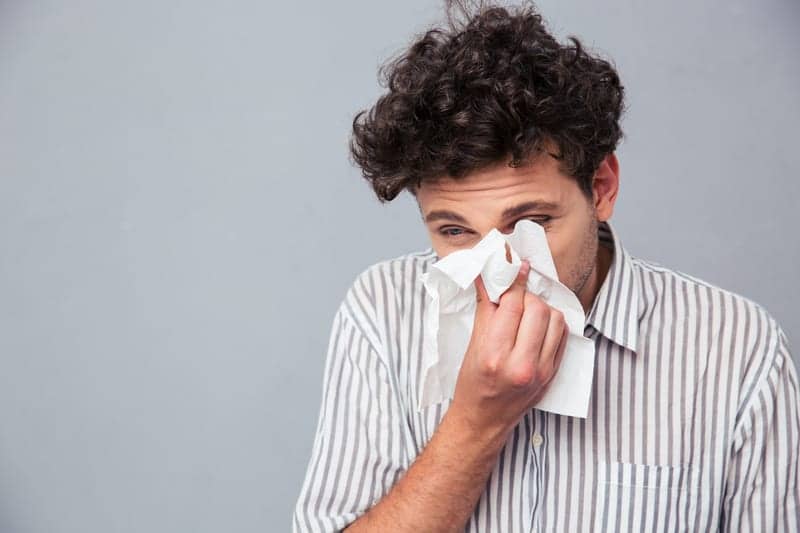Role of Ayurveda in Managing Rhinitis
What is Rhinitis?
Rhinitis is a common medical condition that causes inflammation and irritation in the nasal passage. As per Ayurveda, it is known as Pratishyaya Roga. Rhinitis is mainly a Vata and Kapha disease that provokes sneezing, watery eyes, runny nose, congestion, and itching inside the nose and throat. It can be fostered by numerous factors such as pollen or dust mites, mold, smoke, animal dander, hormonal changes, fumes, and odours. Though, it is not a life-threatening condition and can be healed naturally with the help of Ayurveda. The Ayurvedic treatment for Rhinitis is primarily natural herbs and a few robust adjustments in diet and manner of living.
Types of Rhinitis
Rhinitis can be categorized into two main types – allergic and non-allergic rhinitis. The vital difference between allergic and non-allergic rhinitis is – Allergic rhinitis is triggered by allergens like pollen or pet dander and Non-allergic rhinitis is not related to allergies and can result from infections or irritants like smoke and pollution. Lets understand more about allergic and non allergic rhinitis.
- Allergic Rhinitis
Allergic rhinitis is an allergic inflammation in the nasal membrane. It is also commonly known as hay fever and is a type of Rhinitis characterized as an immune system response to specific allergens like pollen, dust mites, pet danders, or mold spores. When individuals with allergic rhinitis get exposed to these allergens, their immune system releases antibodies that lead to symptoms like sneezing, runny or congested nose, watery eyes, and sometimes fatigue.
- Non-Allergic Rhinitis
Non-allergic rhinitis is not caused by allergens but rather by various irritants that lead to inflammation and congestion of nasal passages. Symptoms of Non-Allergic Rhinitis include a runny nose and consistent sneezing. The factors that commonly trigger it include the change in temperature and humidity, exposure to smoke, and strong odours. Unlike allergic rhinitis, it doesn’t involve the immune system or the production of antibodies.
Who is at risk for Rhinitis?
Factors that are more likely to trigger the risk for rhinitis include:
- Allergies
Individuals with a history of allergies such as high fever and atopic dermatitis are more likely to get affected with Rhinitis.
- Hormonal Changes
The main factor of non-allergic rhinitis is hormonal imbalance. It occurs during pregnancy, periods, and thyroid.
- Breathing in unclean air
The rise in air pollution nowadays is one of the biggest factors that can raise the risk of Rhinitis. Smoke, Dust, Fumes, or air pollution caused by chemical factories and cars are a few examples of unclean or polluted air.
- Regular exposure to fumes
In some work environments, fumes from supplies are discharged which can further be the cause of nonallergic rhinitis. Some common triggers include construction materials, chemicals, and Fumes from the compost.
Tips to Manage Rhinitis with Ayurveda
Rhinitis is caused due to ama (toxin) and decreased immunity in the body. Which affects Vata and Kapha doshas of the body. It is also known for its recurrence & chronicity. According to Ayurveda, it is believed that allergic rhinitis can be controlled and even cured if the right combinations of spices and herbs are used.
- Herbal Remedies
Herbal remedies have been utilized for centuries in the management of rhinitis as they help alleviate its symptoms. These natural remedies often possess antioxidant, astringent, antimicrobial, and analgesic properties that help reduce nasal congestion, sneezing, a runny nose, and allergy-related inflammation without producing any side effects. It also works as an immunity booster that helps fight toxins in the body. Some ideal herbs to treat respiratory problems are Stinging Nettle, Korean Perilla, Ginger, Old Man’s Pepper, Sea Buckthorn, and Yarrow.
- Essential oils
Essential oils possess natural therapeutic properties that help soothe inflammation. By inhaling the aroma of peppermint, lavender, and eucalyptus oils through methods like steam inhalation or diffusers, can provide immense relief by clearing nasal congestion.
Other Oils like tea tree and thyme possess microbial properties that help combat the underlying infections that are contributing to rhinitis.
- Diet
It is essential to understand the potential triggers and make the right dietary choices because they can either exacerbate or help soothe the symptoms of Rhinitis. It is crucial to adopt a diet that is rich in anti-inflammatory and antioxidant properties, such as strawberries, blueberries, Ginger, and turmeric, as they will help provide relief from swelling and irritation in the nasal passage, eyes, and throat. Therefore, Identifying the correct diet is essential.
- Yoga and Meditation
Stress is a well-known factor that exacerbates rhinitis symptoms. Yoga and meditation not only help alleviate it but also promote the overall well-being of an individual by enhancing the functioning of the immune system. Yoga poses such as Vrikshasana, Salamba Sarvangasana,
Virabhadrasana, Halasana, and Matsyasana help improve stamina, and respiratory functioning, and make it easier to breathe.
How does Dr. Sharda Ayurveda help in managing Rhinitis?
Dr. Sharda Ayurveda offers a holistic approach to managing Rhinitis. With the help of Herbal Remedies, the focus is on balancing the Vata and Kapha Doshas of the body as it is the underlying cause of nasal congestion and irritation. Managing a health condition means finding the root cause and helping alleviate it to avoid its recurrence. Dr. Sharda Ayurveda uses a traditional approach with few Dietary and lifestyle modifications tailored according to an individual’s constitution to help manage Rhinitis and promote overall health.
Keep an for more lastest news & updates on World Times!







